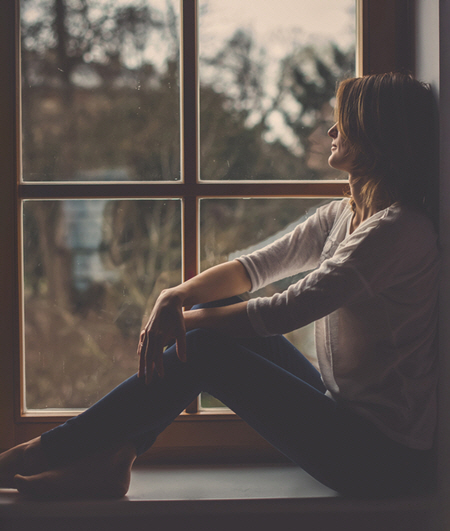 Isn’t the sadness supposed to be gone by now?
Isn’t the sadness supposed to be gone by now?
Everyone around you seems to be moving on. But you just can’t.
Instead, you swing from crying all the time to feeling completely numb.
Even though it’s been a while, you still feel shocked that they are gone.
This is one of the most stressful moments of your life…
Yet you feel like you can’t move.
Shock, confusion, anger, and sorrow keep you curled up in your bed, unable to start your day.
But you don’t let anyone know how bad you are truly feeling. In front of others, you wear a smile, even though your heart feels like it’s breaking.
 And it’s unpredictable…
And it’s unpredictable…
Feeling sad and then moving on is often messaged as the “right way” to grieve in our society.
Maybe you’ve heard of the “stages of grief”: denial, anger, bargaining, depression, and acceptance. But that just hasn’t been the case for you.
Instead, grief comes in waves. It feels more like an emotional rollercoaster than predictable stages.
You can’t help but wonder if you are doing it wrong.
And even if it’s a bit cliché, I’ll assure you anyway:
You’re not doing it wrong.
But even if you know that, it doesn’t always help.
There are still the good days and bad days.
The pain is still there.
And it’s complicated by other things – like feeling as though “moving on” is abandoning your loved one who passed… or that you have to make sure they’re not forgotten to honor the life they lived.
But moving on doesn’t mean you’ve forgotten them.
Finding a way to continue forward with your life doesn’t mean your pain will end or your loved one will be forgotten. Most of us carry our losses throughout life; they become part of who we are.
The pain should gradually become easier to bear, but the memories and the love you had for the person will always remain.
 You don’t have to be alone in your grief.
You don’t have to be alone in your grief.
Working through difficult emotions…
Together, we will create a safe space for you to share your story of what loss has been like for you.
Developing strategies to get through the sadness…
A big theme across many people experiencing grief is the feeling of being alone. We will work on building your support system and staying connected with others during this time.
Building your resilience…
Drawing on your strengths, we will develop healthy coping mechanisms to support you in gradually returning to your life.
Dealing with unresolved issues…
Death may end a life, but not necessarily a relationship. I will guide you through learning how to reconstruct your bond with your loved one rather than relinquishing it.
Adapting to life after loss…
For life after loss, many find comfort in ceremonies and rituals. Rituals can be small, everyday activities, such as lighting a candle, singing or playing music, traveling to a meaningful location, writing a letter, or planting a garden in your loved one’s honor.
These private, personal actions can help you grieve your loved one while you move into returning to your own life.
Let’s honor their life while helping you continue yours…
I’ll be there to support you in every step of your grief, no matter the order. From sharing your stories with tears to creating a ceremony for remembrance, we will cultivate a pathway to healing together.
Call me today to start moving from grief to remembrance: (720) 383-4886.

